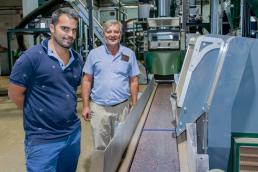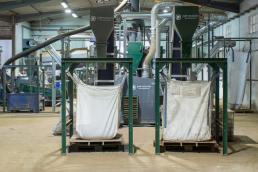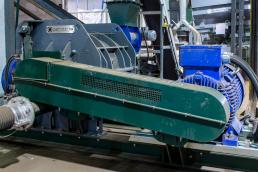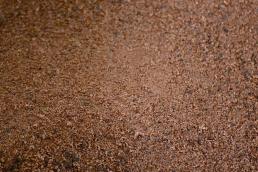Interview with Guilherme Pina, owner of Ecofuturo
Ecofuturo is a young family-run industrial company. Located halfway between Lisbon and Porto, over the years it has decided to specialize in the refining of electric motors and small waste from WEEE, in order to enhance the individual granulated metals.The Owner Guilherme Pina has a clear vision of the future, both in Portugal and throughout Europe. Moving away from traditional trading activities, he preferred to invest in machinery and technologies to maximize the economic value of scrap metal. We recently had the pleasure to meet him and to know better his company , also clarifying the reasons that led him to choose the Compact Panizzolo Recycling Systems refining plant.
Good morning Guilherme. Can you tell us about yourself and the company? What is your story?
Ecofuturo was founded in 2014 in Marinha Grande, the same place where my grandfather started his business of collecting and trading metal and ferrous turnings sixty years ago. He was one of the first in this area and, probably, in all of Portugal. We have grown together with companies in the automotive sector, while the second generation has also expanded the field of action to other medium-light scrap.

When I started to work in the company, as I deepened the dynamics of the market, I realized that investing in recycling plants offered greater opportunities to grow. The Portuguese general mentality was – and still is – strongly linked to selling as it is, and unfortunately my grandfather’s company made no exceptions. For this reason I decided to change my path and found Ecofuturo together with my parents and my brothers.
From the beginning we were able to distinguish ourselves for an industrial mentality, looking for inspiration to the most advanced European companies . The path is still long, but we have already obtained positive feedback and we aim to be recognized for the quality of the granulated metals we obtain in output. To date, 60% of our outputs are sold in Portugal, both to specialized companies and directly to the foundry.
Why this change of direction compared to the grandfather’s company?
Because in pure trade there is no longer any profit or future, especially since the "Chinese National Sword" blocked the export of waste to China in 2015. In recent years, the Portuguese and Spanish market offers good room for maneuver to invest in recycling plants and yet the specialized companies can be counted on the fingers of one hand.
Many exporters insist on looking for new outlets but the future of scrap is here, in our country, where we can re-introduce the raw material into the production cycle. The main problem, as already mentioned, lies in the general mentality. Monetary investments are of little use if there is not an owner with a clear vision and a team of competent employees.
Ecofuturo wants to be a modern company that looks to the future, investing today in innovative technologies for the recycling and recovery of secondary raw materials.
We have made our own experience and we are constantly trying to expand our commercial network, even buying scrap up to Madrid.

How did you start and then develop the corporate treatment cycle?
By founding Ecofuturo, I could count on the passion for the sector handed down by my grandfather, but I built my concrete experience by working directly with the material, machinery and informing myself with other recycling companies. For the first period we focused on the recycling of electrical cables and small WEEE and then, starting from 2018, we also expanded to the treatment of electric motors. We tried, with bad results, to work with Chinese treatment plants: the quality of the metals was not up to our expectations, the productivity was very low while the breakages were more and more frequent. In those years we were expanding our presence in the national and Spanish market and therefore we wanted to invest in a more performing and professional system.
Why did you choose to rely on Panizzolo Recycling Systems?
Through direct experience I’ve understood that the best investment was in the complete enhancement of the copper granulate from electric motors and small WEEE. I carefully analyzed what the European market offered, finding Italian companies very well prepared in this field. Finally, the choice fell on the refining plant of Panizzolo Recycling Systems, as it immediately seemed to me the most suitable for achieving our production and quality objectives.
Visiting Panizzolo I particularly appreciated the transparency, honesty and experience of Mauro Panizzolo and his collaborators. The company is growing thanks to its direct experience in scrap grinding, learning every day from its grinding processes and developing the treatment and refining cycles in their plant near Padua. I identify with Mauro Panizzolo a lot and I find that he has an edge over those who, without any experience, have the only goal of selling you only his product.
We chose the Panizzolo Recycling Systems plant also for the modularity of the elements and for the simplicity of maintenance. In the first case this will allow us to quickly install any upgrades, according to our production needs, while in the second case we can easily maintain a constantly high quality of workmanship.
In comparison to the previous one, what benefits have you obtained with the Panizzolo refining plant?
Before Panizzolo our refining cycle was based on a Chinese plant which caused me important limitations and problems. For example, the pre-ground from electric motors had to be processed over and over again, discarding many metals before reaching the final output. The production ratio between pre-grinding and refining was very low, about 200-300 kg / hour, with long periods of storage of both incoming and outgoing material; not to mention any delays due to the turbine being blocked. In the input there is commonly a percentage of steel, aluminum and iron which increased the abnormal wear of the blades, also causing them to break.
Today the Compact Refining plant allows me to avoid these problems. The refiner hammer mill does not fear the heaviest metals, in a single step I recover and maximize the quality of the metals, saving time, effort and operators involved.

We are currently still bringing the plant to production capacity, but we have already exceeded expectations and we are sure to reach almost 1 ton / hour of processed material. Obviously everything will depend on the type of material we decide to work with. The Compact Refining plant will allow us to further expand the range of treated waste, also refining all those types of fluff that are difficult to locate both in Portugal and Spain.
Even today we are building our experience with a treatment cycle, knowing that Panizzolo provides a professional remote consulting service. At the same time I push my collaborators to build their own experience, an element that will distinguish us in the national market.
What will be the future of scrap companies in Portugal? And what are your next business goals?
In the near future, I expect to see a market increasingly oriented towards waste treatment, with the gradual disappearance of traders focused only on exports. The survival of Portuguese companies in the coming years will depend on their ability to initiate a path of professionalization both from an organizational and production point of view. The national and European market wants ever greater structuring, organization and modern waste treatment cycles for the reintroduction of secondary raw material.
At the moment in Portugal there are reasonable investment opportunities and I am convinced that Ecofuturo is pursuing the best possible path, thanks also to the high production quality of the Compact Refining Plant supplied by Panizzolo Recycling Systems. In the next few years my goal will be to expand and consolidate our presence in the Portuguese and Spanish market and, once the plant is fully operational, I do not exclude the possibility of further investing in a Panizzolo hammer mill to improve and implement the cycle. of pre-grinding of the scrap I buy.
